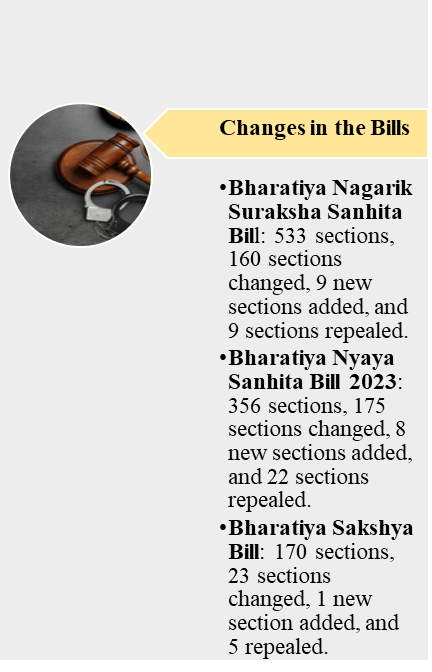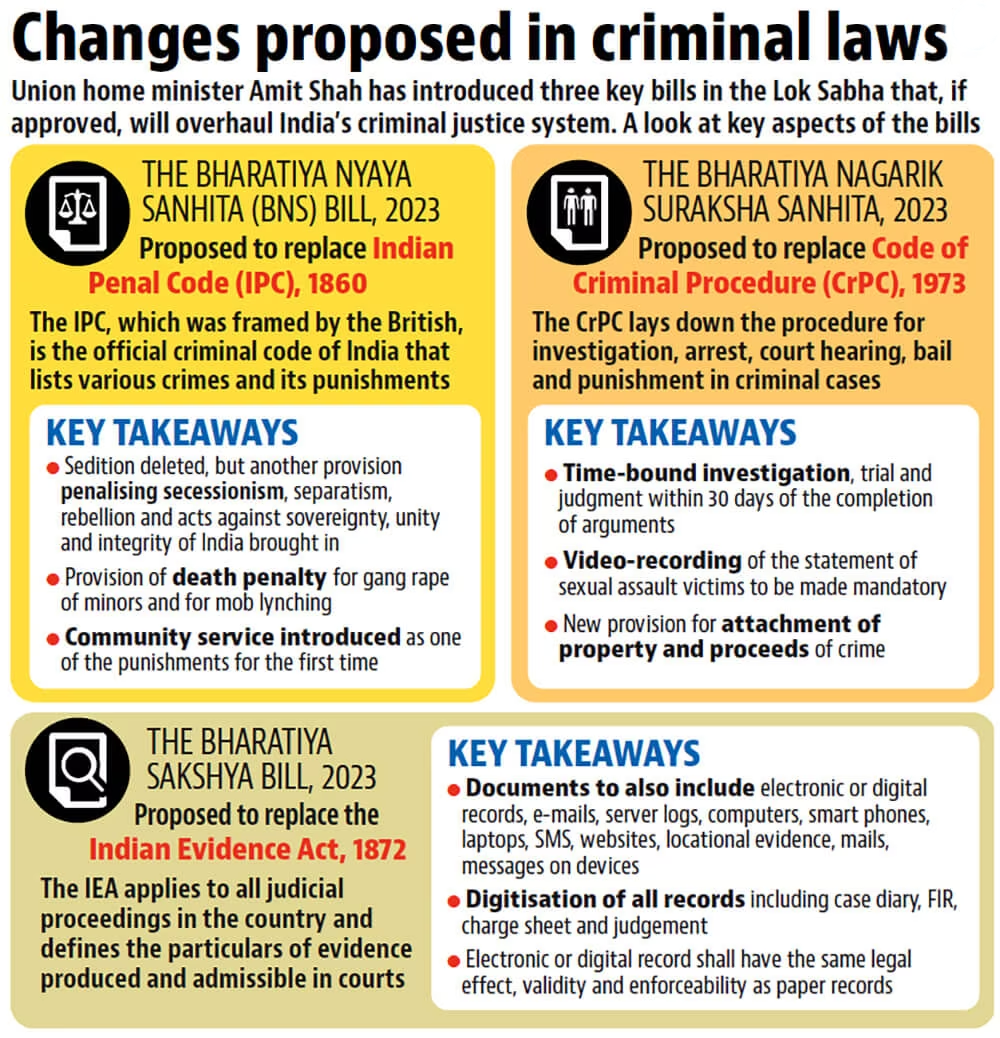Why in News?
The text discusses the enactment of three new criminal laws in India, namely the Bharatiya Nyay Sanhita, Bharatiya Nagarik Suraksha Sanhita, and Bharatiya Sakshya Adhiniyam, scheduled to come into force on July 1, 2024. Additionally, Section 106(2) of the Bharatiya Nayay Sanhita has been temporarily put on hold by the Central government. The Ministry of Home Affairs and State governments are making preparations for a smooth transition.
Key Highlights

- Enactment of New Laws: Three new criminal laws are introduced to replace existing ones: Bharatiya Nyay Sanhita (Indian Penal Code replacement), Bharatiya Nagarik Suraksha Sanhita (Code of Criminal Procedure replacement), and Bharatiya Sakshya Adhiniyam (Indian Evidence Act replacement). These laws are set to be effective from July 1, 2024.
- Section 106(2) on Hold: Section 106(2) of Bharatiya Nayay Sanhita, imposing 10 years imprisonment for not immediately reporting fatal accidents, has been put on hold by the Central government.
- Preparations for Transition: The Ministry of Home Affairs and State governments are actively preparing for a smooth transition to the new laws, with some adjustments made in Bharatiya Nagarik Suraksha Sanhita regarding investigation and police functioning.
- Electronic Evidence Changes: The Bharatiya Sakshya Adhiniyam introduces some changes, such as a slightly broadened scope of secondary evidence and modifications in provisions related to electronic evidence.
- Clarity on Electronic Record Definitions: Clarity on electronic record definitions, including the definition of “document” encompassing electronic and digital records. It specifies types of electronic records like emails, server logs, and messages.
- Admissibility of Electronic Records: The admissibility of electronic records is discussed, referencing Section 63 of the Bharatiya Sakshya Adhiniyam, equivalent to Section 65-B of the Indian Evidence Act. The Supreme Court’s ruling in Arjun Panditrao Khotkar vs Kailash Kushanrao Gorantyal & Ors. (2020) is highlighted, emphasizing the importance of the required certificate for admissibility.
- Expert Certification and Hash Algorithms: Section 63(4) of Bharatiya Sakshya Adhiniyam requires a certificate to be signed by two persons, including an expert. The expert must verify the certificate using specific hash algorithms (e.g., SHA1, SHA256, MD5) to ensure the integrity of data. The potential impact on cyber laboratories and the need for general awareness about encryption methods are discussed.
- Increased Workload for Cyber Laboratories: The requirement for expert certification may increase the workload of cyber laboratories, especially concerning crimes involving smartphones and electronic records. There is a concern about the capacity of some labs, as not all are equipped with sufficient manpower or notified under the IT Act.
- Call for General Awareness and Infrastructure Readiness: A need for a general awareness drive on encryption methods, particularly for private agencies. Enforcement agencies are urged to ensure that the necessary infrastructure is in place before the laws come into effect in July 2024.


History Context
- Throughout India’s history, various criminal justice systems have evolved in different regions under different rulers.
British Rule and Codification
- During the British rule, criminal laws were codified in India. The Indian Penal Code (IPC) was drafted in 1860, following the establishment of the first law commission in 1834 under the Charter Act of 1833. The IPC became effective on January 1st, 1862.
Indian Evidence Act (IEA)
- The IEA, originally passed by the Imperial Legislative Council in 1872 during the British Raj, provides rules governing the admissibility of evidence in Indian courts of law.
Code of Criminal Procedure (CrPC)
- The Code of Criminal Procedure (CrPC), enacted in 1973, provides procedures for administering criminal law in India. It became effective on April 1st, 1974.
Recent Legislative Changes
- In December 2023, the Indian Parliament passed three significant Bills: Bharatiya Nyaya (Second) Sanhita, 2023; Bharatiya Nagarik Suraksha (Second) Sanhita, 2023; and Bharatiya Sakshya (Second) Bill, 2023, aiming to overhaul the criminal justice system.
Introduction of New Bills

Union Home Minister Shri Amit Shah introduced three bills in the Lok Sabha; Bharatiya Nyaya Sanhita Bill 2023, Bharatiya Nagarik Suraksha Sanhita Bill 2023, and Bharatiya Sakshya Bill 2023.
- Replacement of British-Era Laws: The new bills aim to replace the British-era laws, specifically the Indian Penal Code, 1860; Criminal Procedure Code, 1898; and Indian Evidence Act, 1872.
- Objective and Soul of the New Laws: The new laws are designed to protect the rights given to Indian citizens by the constitution. The emphasis is on justice rather than punishment, in contrast to the earlier laws that focused on strengthening British rule.
- Consultation Process: The formulation of these laws involved extensive consultation, including inputs from 18 states, 6 union territories, the Supreme Court, High Courts, law universities, Members of Parliament, and the public.
- Modernization and Digitization: The new laws incorporate modern technologies, including an expanded definition of documents to include electronic records. The entire process from FIR to judgment will be digitized, and videography during search and seizure is made compulsory.
- Focus on Forensic Science: A historic decision to establish the National Forensic Science University is announced. The goal is to increase the number of forensic science experts, aiming for a conviction ratio above 90%.
- Zero FIR and e-FIR: Introduction of Zero FIR after 75 years of independence for citizen convenience. Provision of e-FIR and designated police officers to inform the family of the arrested person about the arrest online and in person.
- Enhanced Punishments: Provisions for harsh punishments in cases of inter-state gangs, organized crimes, and crimes against women. Introduction of community service as a form of punishment.
- Judicial Reforms: Time limits set for filing charge sheets and framing charges. Courts bound to give notice of framing charges within 60 days. Online availability of orders within 7 days.
- Abolishment of Sedition Law: The sedition law is to be completely repealed, emphasizing the right to freedom of speech in a democratic India.
- Definition of Terrorism: For the first time, crimes like secession, armed insurgency, subversive activities, separatism, and challenges to the unity, sovereignty, and integrity of India are defined as terrorism.
- Trial in Absentia: A historic decision allows the trial and sentencing of a person declared a fugitive in absentia. Appeals against the sentence must follow Indian law.
- Overall Changes: A total of 313 changes are made in the laws to bring about widespread changes in India’s criminal justice system, aiming for quicker justice delivery within a maximum of 3 years.
- Focus on Women and Children: Special provisions are made to protect the rights of women and children, with an emphasis on preventing police misuse of power.
- Crackdown on Heinous Crimes: While repealing certain laws, provisions for punishment for exploiting women, tackling mob lynching, and cracking down on organized crimes and terrorism are introduced.

Provisions of Bharatiya Sakshya Adhiniyam, 2023 (BSA)
Retained Provisions from IEA, 1872

Key Changes Incorporated in BSA, 2023
Documentary Evidence
- A document includes electronic records in addition to writings, maps, and caricatures.
- Primary evidence includes original documents, electronic records, and video recordings.
- Secondary evidence expanded to include oral and written admissions, and testimony of a qualified document examiner.
Oral Evidence
- Oral evidence includes statements made electronically.
- Allows witnesses, accused persons, and victims to testify through electronic means.
Admissibility of Electronic or Digital Records as Evidence
- Documentary evidence includes information in electronic records stored in optical or magnetic media produced by a computer.
- Information may be stored or processed by a combination of computers.

Joint Trials
- In a joint trial, if a confession affects multiple accused, it is treated as a confession against all (IEA provision).
- BSA adds an explanation, stating that a trial involving an absconded accused or one not responding to an arrest warrant is considered a joint trial.
Concerns Regarding Provisions of Bharatiya Sakshya Adhiniyam, 2023 (BSA)

Steps Need to be Taken to Make BSA More Effective
Recommendations of Standing Committee on Home Affairs (2023)
- Safeguard authenticity and integrity of electronic records prone to tampering.
- Mandate secure handling and processing of electronic records through a proper chain of custody during investigations.
Guidelines by Karnataka High Court (2021)
- Qualified forensic examiner to accompany the search team.
- Prohibition on Investigating Officer’s use of seized electronic devices during searches.
- Seizure and packing of electronic storage devices in Faraday bags to block electromagnetic signals.
Directive Proposal of EU
- Mandate use of electronic evidence only with sufficient evidence of non-manipulation or forgery.
- Ensure secure handling of evidence from production to chain of custody.
- Involvement of IT experts at the accused’s request.
Law Commission Recommendations (2003)
- Prohibition of provability of facts discovered through threats, coercion, violence, or torture.
- Relevance of facts discovered in or outside police custody.
- Presumption of police-caused injuries if a person in custody is injured.
Malimath Committee Recommendations (2003)
- Introduction of ‘social welfare offences’ category for minor violations.
- Replacement of adversarial system with a ‘mixed system.’
- Reduction of the standard of proof required for conviction.
- Admissibility of confessions made before a senior police officer.
The Bharatiya Sakshya Adhiniyam brings clarity to electronic records’ definition and admissibility, emphasizing expert certification and hash algorithms. However, challenges for cyber laboratories are anticipated due to increased workload. It is crucial for enforcement agencies to raise awareness about encryption methods and ensure necessary infrastructure before the laws take effect, reflecting a commitment to modernize criminal laws in India for emerging digital challenges.


 MPSC राज्य सेवा – 2025
MPSC राज्य सेवा – 2025
